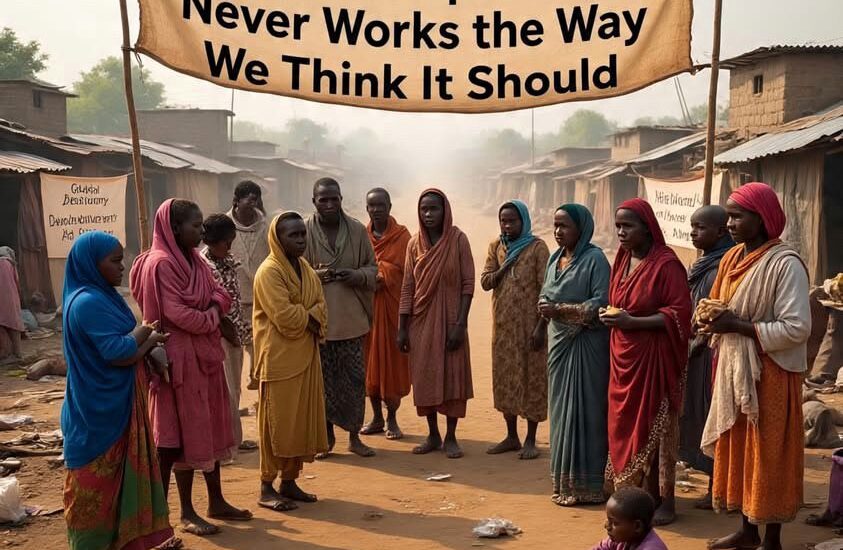I remember sitting in my first sociology seminar years ago when the professor asked us what we thought about foreign aid. Most of us had these romantic notions about wealthy countries helping poor ones, about building schools and digging wells, about progress marching steadily forward. Then she showed us a documentary about a failed water project in rural Kenya, and everything I thought I knew started to unravel. Exploring why foreign aid often fails: the complex power dynamics, perverse incentives, and structural realities behind global development programs.
The sociology of global development and aid is messier than anyone wants to admit. We like clean narratives about donors and recipients, about developed and developing nations, about problems and solutions. But the reality on the ground looks nothing like the glossy brochures from international NGOs or the carefully worded press releases from government aid agencies.
What strikes me most about studying development sociology is how often we get the power dynamics completely backward. We talk about aid as if it flows in one direction, from the generous North to the grateful South. But anyone who has spent time examining these relationships knows that aid creates complex webs of obligation, dependency, and influence that run in multiple directions at once. The donor countries shape policy in recipient nations, sure, but recipient governments also become incredibly skilled at playing donors against each other, at telling different stories to different audiences, at maintaining just enough dysfunction to keep the aid flowing while preventing so much chaos that donors pull out entirely.

I once spoke with a woman who had worked for a major development agency in East Africa for fifteen years. She told me something that has stuck with me ever since. She said that half of her job was writing reports that made projects look successful enough to justify continued funding but not so successful that headquarters would think the problem was solved and move resources elsewhere. Think about that for a moment. The incentive structure of international development actually rewards maintaining problems rather than solving them.
The sociology of aid reveals these perverse incentives at every level. Development workers need jobs, so they need ongoing projects. Aid agencies need to justify their budgets, so they need continued crises. Consulting firms need contracts, so they need complex problems that require expensive expertise. Even recipient governments sometimes benefit more from the aid infrastructure itself than from the supposed outcomes of development projects. A ministry that administers foreign aid becomes a source of patronage, employment, and resources that can be redirected in countless subtle ways.
This is not to say that everyone involved in global development is cynical or corrupt. Most people I have encountered in this field genuinely want to help, genuinely believe in what they are doing. But good intentions collide with structural realities in ways that sociology helps us understand. When you parachute Western development models into societies with completely different social structures, historical trajectories, and cultural logics, things go sideways in predictable ways.

Take microfinance as an example that development circles loved for decades. The idea seemed elegant enough: give small loans to poor entrepreneurs, especially women, and they would lift themselves out of poverty through business ventures. Donors poured billions into microfinance institutions. Then sociologists started looking closely at what actually happened in borrowing communities. They found women taking loans not to start businesses but to meet immediate household needs. They found loan officers pressuring borrowers in ways that replicated oppressive social hierarchies. They found that access to credit without addressing deeper structural inequalities often just meant poor people went into debt.
The challenge with global development aid is that it operates at the intersection of economics, politics, culture, and history. You cannot understand why a agricultural development project fails without understanding local land tenure systems, gender relations, historical experiences with colonial extraction, current political rivalries, and a dozen other factors that never make it into the project proposal. Development sociology teaches us to ask uncomfortable questions about whose knowledge counts, whose voices get heard, and whose vision of progress becomes the blueprint for everyone else.
What frustrates me most is how resistant the development industry remains to these sociological insights. The same failed approaches get recycled with new terminology. We went from modernization theory to structural adjustment to poverty reduction strategies to sustainable development goals, but the underlying assumptions often stay remarkably consistent. The West still largely defines what development means, what success looks like, what problems matter.
Reference
Easterly, W. (2006). The white man’s burden: Why the West’s efforts to aid the rest have done so much ill and so little good. Penguin Press.
Escobar, A. (1995). Encountering development: The making and unmaking of the Third World. Princeton University Press.
Ferguson, J. (1994). The anti-politics machine: “Development,” depoliticization, and bureaucratic power in Lesotho. University of Minnesota Press.

